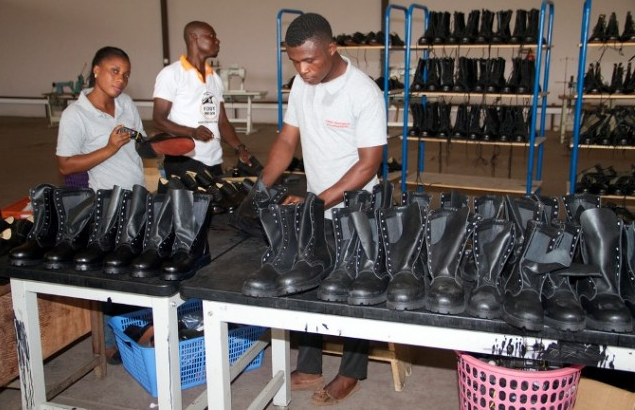
We can’t even sustain a Shoe Factory
On March 23, 2016, people like me who believe in state interventions woke up to sadness. Headlined, ‘Kumasi Shoe Factory failing’, a story posted online by a freelance journalist reported that “the Kumasi Shoe Factory, with the capacity to produce more than 700,000 shoes and sandals annually and ability to employ more than 2,500 people is still a pale shadow of its prospects.”
Advertisement
Why?
The reason came from the President of the Republic of Ghana. A Ghana News Agency story filed on April 18, 2016 quoted President John Dramani Mahama as lamenting before the Council of State that some security agencies were procuring security boots from other countries, while abandoning those produced by the Kumasi Shoe Factory.
Hear the President’s lament: “Although the Kumasi Shoe Factory is producing high quality boots for the security services, most of them are still importing from other countries, thereby disobeying my instructions”.
Frightening!
A month or so earlier, during a factory visit by the media, Dr Karl Ayikai Laryea, Board Chair, announced that the factory had been awarded a contract by the Customs Division of the Ghana Revenue Authority to produce 500 pairs of boots to be used for the Independence Day parade.
Good news? I thought so, that was, until I read the real reason behind the Customs Division’s order. According to Dr Laryea, the division had to fall on the factory “at the last minute when the company they had earlier contracted to produce the boots disappointed them.”
For the benefit of Ghanaians either too young to know, have not read or been told the history, the shoe factory used to be the Footwear Division of the erstwhile Ghana Industrial Holding Corporation (GIHOC), established by President Kwame Nkrumah in 1960.
Following the overthrow of Dr Nkrumah, the company collapsed but was revived in November 2012 through collaboration between a Czech-based company, Knights, and the Defence Industries Holding Company (DIHOC) of Ghana’s Ministry of Defence.
A 50-million-dollar credit was secured to get the place running once again.
At its inauguration, the then Defence Minister said, “It is very clear that we can solve the basic problem of unemployment if we put our minds to the task. The examples of Brazil, China and India have taught us that we should pursue the goal of self-sufficiency.”
From all accounts since the factory’s return, however, it is clear that we have learned everything but the examples of China, Brazil and India. Even it is argued that these are all foreign examples, did the feasibility report produced by Ghanaians, some of whom are world-class consultants, based on whose recommendations the decision was made to revive the factory, not provide the history and reasons for the factory’s past troubles?
So why is the factory failing?
Dr Karl Laryea has the answer: Policies! Mincing no words in a country that lives on euphemisms, he said, ”the government appears to be paying lip-service to local companies”. According to him, Ghanaian security agencies continue to buy them from China and India when we can produce the same thing at a better quality.”
The board chair was certain that “with just a single policy, local companies could compete with most of the foreign companies that export into the country.”
For yours truly, who shares Kwame Nkrumah’s confidence that the Black Man is capable of solving his own problems, Dr Laryea’s reference to “right policies” should translate into a deliberate government policy compelling all students to wear made-in-Ghana sandals and all government agencies to buy from local manufacturers.
We can pretend not to know, but history has evidence that this is how the developed countries became what they are today —supporting their local industries and not opening their doors to all sorts of products to flood their markets.
Whom am I preaching to? Are we not in a country whose Parliament imported chairs (my God, chairs!) from China, a month or so after the President went on air to plead with Ghanaians to patronise Ghana-made goods in Kwame Nkrumah’s Ghana that used to produce glass in the 1960s?
And just in case, we are confused how to go about it, kindly listen to Dr Laryea: “We don’t need to ban any products from coming. What is needed to solve unemployment is a policy that compels government agencies to buy from local manufacturers.
I fell in love with China when I read their strategy. Goods, including luxuries made in the West, are not banned in China, except that the western companies have to set up factories in China to produce them in-situ.
Here is the Third World problem: our educational system produces intellectuals who can manage advanced industrialised hi-tech economies. Our education has not trained us to manage innovation for people who barely know how to work with the most rudimentary technologies.
I don’t subscribe to the theory that state corporations are inherently unworkable. How could Ghana Airways work when the government officials loaded each flight with their shopping and then they themselves and their girlfriends flew British Airways, KLM, Lufthansa name them?
This, plus the greed, is our bane.



